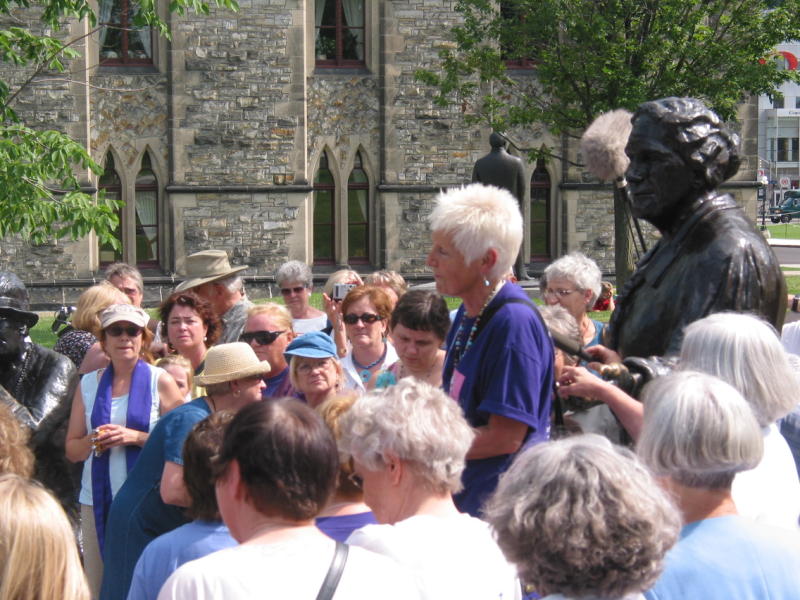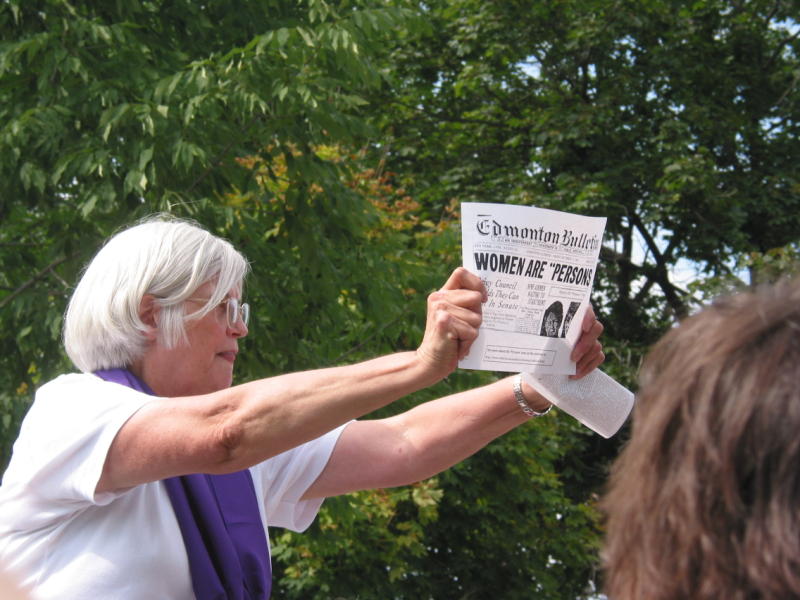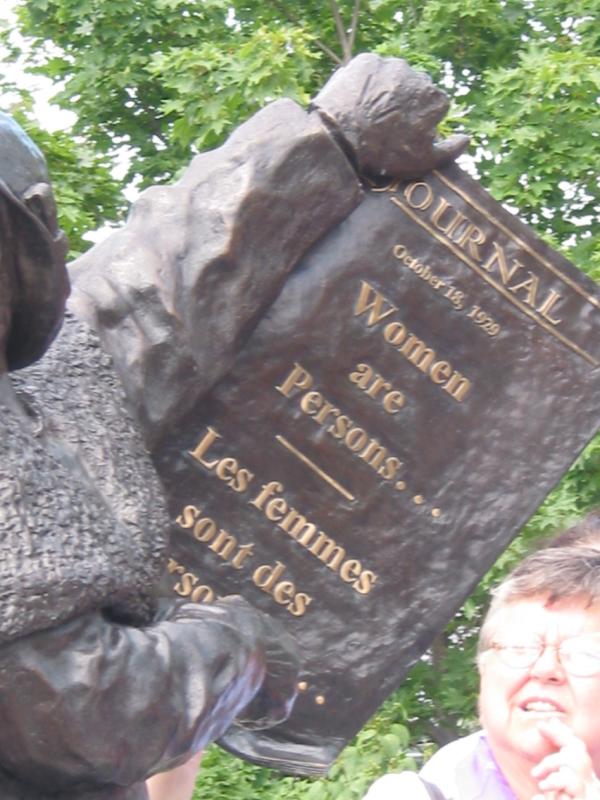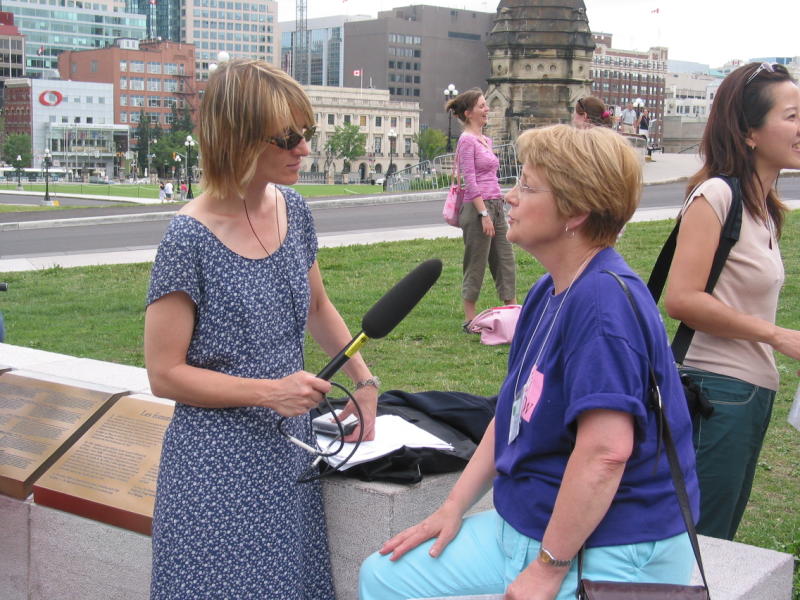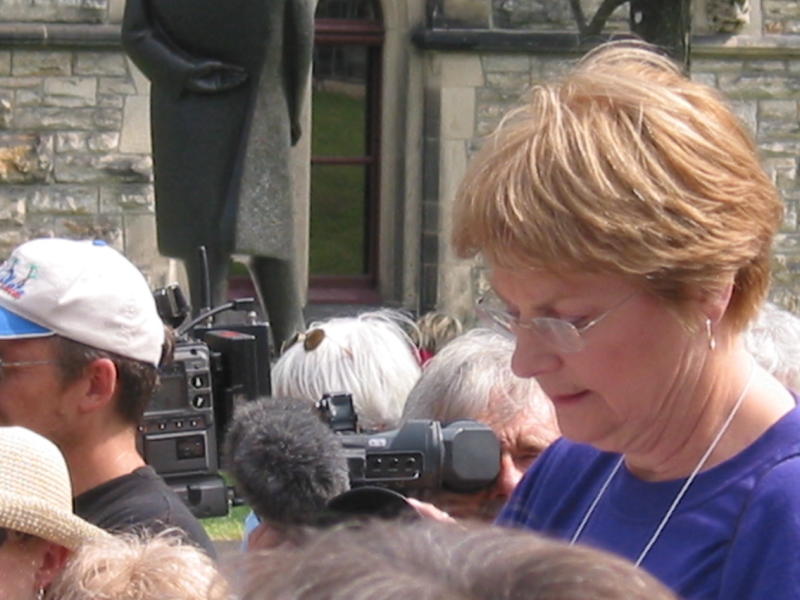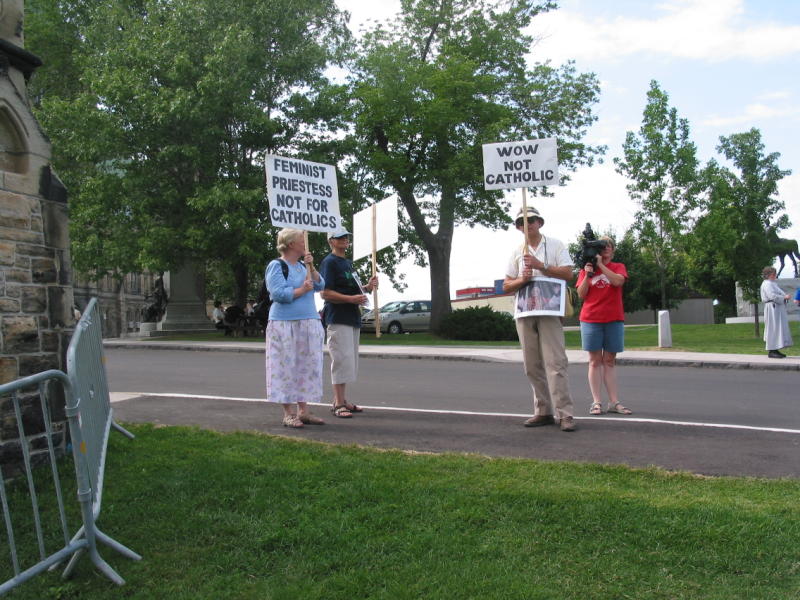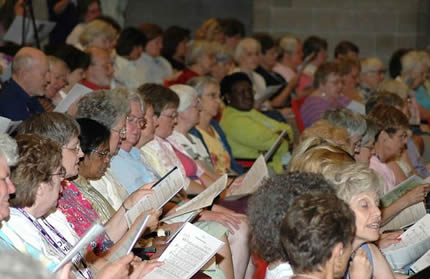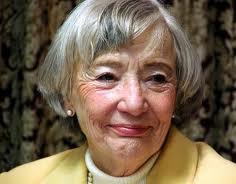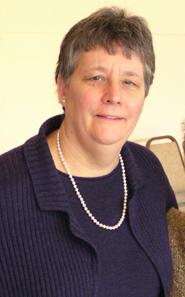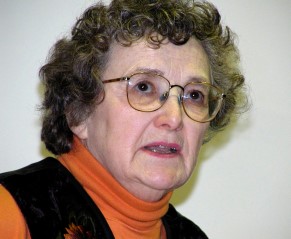We have gathered this weekend because we have heard the call of Divine Wisdom and have been sent out as her wo/men ministers to proclaim her invitation. We have come together here to celebrate our common struggles for a just church and to renew our vision for a world free of oppression. We have assembled as the ekklesia of wo/men in the discipleship of equals. We have come from near and far to be church - a kindom of priests - to use a term coined by mujerista theologian Ada Maria Isasi Diaz 2. We have assembled here to celebrate our baptismal call and to share with each other our lived and variegated gifts as ministers of Divine Wisdom - Spirit . We have assembled here to proclaim: Wo/men are the image of G*d and the representatives of Christ - Sophia. We are Her ministers as pastors, priests, hospital chaplains, campus ministers, theologians, bishops, teachers, liturgists, canon lawyers, presidents, directors, professors, dancers, counselors, as celebrants of the table of Divine Wisdom.3 We are in the words of the First Epistle of Peter:
a chosen race, a royal priesthood, a holy nation, God's own people, in order that we may proclaim the mighty acts of Wisdom-Sophia who has called us out of darkness into G*d's marvelous light.
(paraphrase of 1 Peter 2:9-10 NRSV)
These words not only have been the Magna Carta of the Protestant Reformation but also the guiding star of Vatican II. They affirm the radical equality and priestly dignity of the people of G*d, of all those called, anointed and gifted in baptism to proclaim the wonderful deeds of Divine Wisdom-Sophia around the world.
The recognition of wo/men as full ekklesial citizens with all rights and duties is central to this vision of a kindom of priests, a radical democratic church. It demands a new theological articulation and self-understanding of ministry and church. It insists with Post-Vatican II theology that "ministry as a gift of the Spirit is more fundamental and comprehensive than order."4 It requires a feminist articulation of Catholic identity not as sameness but as rich diversity and variegated giftedness in the power of Divine Spirit-Wisdom. By the f-word feminism I mean a theoretical perspective and world-wide radical democratic movement that is inspired by the conviction that wo/men are people, i.e. fully entitled and responsible citizens in society and religion.
However, this feminist vision of a radical democratic catholic church which is inspired by Vatican II seems at this point in time an illusion. It seems to function as "pie in the sky," which keeps progressive people in a church that is run more like the Roman empire than the ekklesia of Christ. The male clergy and hierarchy of the Roman church seems morally bankrupt, as the scandals and cover-ups of sexual abuse by priests and bishops or the Vatican's prohibition of condoms in the AIDS crisis have amply documented. The U.S hierarchy, for instance, lost its last shred of religious-moral credibility in the most recent election when bishops made candidates' position against wo/men's reproductive rights the key issue of Catholic identity while not caring for those on death row or the millions of children who are born daily into dehumanizing poverty and starvation or who are killed by American bombs and occupation.
It is no wonder that I am often asked: Why do you as a feminist stay in this church? Why do you still call yourself a Catholic theologian? These questions are serious challenges but in my view they are wrong-headed because they presuppose that the hierarchy is the church rather than that we the people of G*d are the church whom the hierarchy is called to serve. To move out of the church rather than to continue the struggle within it would mean giving up our birth-right and abandoning our people who are Catholic wo/men. (By the way, I use wo/men as inclusive of men and invite men in the audience to learn like wo/men to think twice and to ask whether they are meant when I speak of wo/men. I recommend this as a good spiritual exercise for the next 100 years or more.)
We have assembled here as church - as a kindom of priests - because we still have a dream. Barbara Harris, the first African American Episcopalian wo/man bishop wrote an article at the occasion of the tenth anniversary of the ordination of Episcopal wo/men to the priesthood which was entitled: "Celebrating a Dream yet to Come True." What is this dream that still needs to be realized? Is this the dream that we wo/men in the Roman Catholic church finally will be able to call ourselves Reverend, to wear the clerical collar, to don clerical vestments and to receive the clerical privilege of saying mass and being paid for it? Is it the dream to receive the "indelible" mark of ordained hierarchical priesthood that makes us essentially different from the so-called laity who are turned, through the ordination of a few, into permanent second class citizens not only in the church but also in heaven? Is it the dream of getting a piece of the clerical pie through ordination?
Or is it the dream to realize a different ministry and church, the dream to transform as ministers of Divine Wisdom the hierarchal Roman church into the discipleship of equals? True, this dream is u-topian, it is without a place in the Roman hierarchy, but it is not "pie in the sky." Rather, this dream has been partially realized throughout the centuries in ever new Reform movements. In the past 30 years or so it has become lived reality in and through the Catholic feminist movement whenever and wherever wo/men have claimed our call to ekklesial ministry and like Divine Wisdom have prepared the table and broken bread in the discipleship of equals.
Three such grace filled moments of "new priestly" ministry stand out in my memory .
At the second Ordination Conference in 1978 I was going to issue a call for "partial" identification with church and a spiritual hunger strike protesting the "male- celebrant- only" eucharist, a call which was considered as too radical by some of the Conference organizers.. The evening before my speech, I discovered a small notice inviting participants to come to a hotel room to celebrate a liturgy that was scheduled at the same time as the official liturgy with a male presider. I went with trepidation to the hotel room where the bilingual liturgy was to take place expecting only a very few to have the courage to celebrate such a feminist breaking of bread. If not feminist such a liturgy, I feared, could turn out to be a painfully fumbled event. My fears quickly dissipated when I saw the crowd of wo/men present to break bread and to claim their priestly power. Celebrating such a radical democratic liturgy was one of the most moving sacramental experiences I have had. Before my eyes and ears my theological theories and convictions had "become flesh."
The second event took place at the first International Wo/men-Church Conference in 1983 in Chicago. For me, one of the most memorable experiences of the conference was the liturgy of blessing that was celebrated to express the intrinsic link between the Wo/men-Church gathering and the scheduled Dialogue of Catholic bishops with representatives of 13 Catholic Women's Organizations in Washington. As one of the theologians invited to speak to the bishops, together with Sr. Theresa Kane I was commissioned and blessed by the assembly that is the ekklesia, to speak in the name of wo/men-church, a ritual that carried all overtones of ordination. One of the wo/men in the audience spontaneously acknowledged this interpretation by giving me a stole woven in Guatemala. Its multicolored symbolism, in addition to Marsie Silvestro's blessing song - "So, go gently, my sister, let courage be your song"- have encouraged and accompanied me well beyond these two events of great ecclesial significance.
The third experience of the work of Divine Wisdom among us happened at the 20th Anniversary Conference of WOC in 1995 which envisioned a "Discipleship of Equals - Breaking Bread - Doing Justice." Diann Neu, the liturgical coordinator of the Conference, proclaimed at the "Laying on of Hands" celebration
Spirit of life and of power
time and again throughout history
you call forth your ministers from the community
and send them to do works of justice:
to feed hungry souls,
to give drink to thirsty ones,
to free captives.
Come Ruach, Sophia-Wisdom, Fulfiller of Promises
Bless us your feminist ministers,
To do your works of justice
After this invocation Diann invited the gathered ekklesia to raise their hands if they wanted to be called forth and be blessed by the community for their particular feminist ministry.5 The rich variety of feminist ministries became visibly embodied when hundreds of hands were raised in response. Following her example let us try to recreate this Spirit-empowered moment as the crucial empowering performance of wo/men's "ordination" to church leadership. To do so, I invite you to stand up or give another sign, when I mention the area of ministry to which you are called:
Feminist ministers rise and stand upright -as you are able - if you want a laying on of hands :6
I call the ministers of political and feminist grassroots-organizing
I call the ministers of feminist healing all that is violated, broken and weak
I call the ministers of feminist education: teaching, mentoring, writing feminist theologies
I call the ministers of the arts: dance, music, performance, visual arts
I call the ministers creating feminist liturgies, preaching, praying, singing, dancing ,
celebrating Eucharist, the table of Divine Wisdom
I call the ministers of feminist faith-sharing and struggles against violence
I call the ministers of self-affirmation and spiritual strengthening
I call the ministers of caring for the earth and all of creation
I call the ministers dedicated to enable sharing between wo/men of different churches, religions, races, cultures, sexes and nations
I call the ministers building up the community of equals in parishes, and all areas of church and society
I call the ministers of reconciliation and the overcoming of prejudice
I call the ministers fostering recognition of the Divine Image in everyone
I call all ministers whose work is crucial for realizing the discipleship of equals.
After having asked for a laying on of hands, ordination by the Holy Spirit-Wisdom, please stretch out your hands in blessing and invoke with me the power of Divine Wisdom upon this assembly of ministers: Please repeat after me
Holy Spirit, Divine Wisdom
bless your ministers who are standing upright as full religious citizens
to do your works of justice and love
struggling for the ekklesia of wo/men,
a kindom of priests and a discipleship of equals.
[Please be seated]
I have asked you to make bodily present the manifold priestly ministries in our midst with which Holy Wisdom has gifted the ekklesia because I fear that the wo/men's ordination movement is in danger of forgetting our pioneering struggles for rich and variegated priestly ministries as gifts of Divine Wisdom-Spirit to the ekklesia.7 The Women's Ordination Movement risks becoming an anti-movement, fixated on wo/men's exclusion from the "sacred power of domination," rather than an alternative movement which celebrates the rich array of creative ekklesial ministries that wo/men already are performing. By seeking ordination at any price, we are in danger of constructing an anti-hierarchy of wo/men which is still a hierarchy. By co-opting the rites, vestments, selection practices, titles of the hierarchy we risk to re-inscribe them.8
Rose Wu's article entitled "From the Ordination of Women to the Priesthood of all Believers," is a wake up call not only for Protestant ordained wo/men but also for us. Speaking at the occasion of the 25th anniversary of the ordination of Episcopal Wo/men she concludes her reflections which I will quote in full:
In 1990, two years after I graduated from Seminary, I was invited to be the assistant chaplain of Chung Chi College [of the Chinese University of Hong Kong], the first time they had accepted a lay woman to take this post. However I was supposed to seek ordination in the near future if I wanted to remain in this position. Two years later I decided to leave this post because I did not think that seeking ordination is my calling and a reflection of my will. I support women's ordination based on the principle of equality. However, I am not convinced that by ordaining women the Church will become more inclusive and participatory. To me the exclusion of wo/men to the priesthood is only one indication of its oppressive nature. To renew the Church and exorcise it from all forms of oppression, we must tackle the root cause of all these problems. To me, it is a choice between whether we want a community that shares power or whether we want power to be held by only a few.9
Like Rose Wu I fear that the struggle for wo/men's ordination has been modeled in analogy to the liberal women's rights movement that did not seek to change society but only to move wo/men into positions of male power which excluded us from its ranks. Therefore, we like clergy wo/men in other churches are in danger of strengthening the present hierarchical structures by struggling to move into them. If we do not reject ordination into clergy privilege and sacred structures of domination, WOW could re-enforce the second class citizenship of the majority of church wo/men, the so-called laity.
If we want to avoid this danger, we have to continue to integrate the struggle for ordination into the variegated feminist struggles around the world. We have to articulate and practice a different vision of church and ministry in the context of wo/men's struggles for food, self-determination, and bodily integrity. Like Rose Wu I am convinced that only the struggle for "a community that shares power" in the discipleship of equals will overcome the second class citizenship of wo/men. Hence, we must take care that WOW remains an integral part of the struggle against a kyriarchal clerical tradition, the struggle against sacred structures of domination that on principle have excluded wo/men from ekklesial authority and increasingly speak again the language of silencing, control and violence. This struggle for feminist catholicity and a radical democratic church and ministry is the struggle for freedom of thought, intellectual independence and personal integrity, for the free and uncensored speech of citizens, for the life-giving power of Divine Spirit-Wisdom; it is the struggle for church as ekklesia, as the congress of the people of G*d, as a fully decision making assembly, as the ekklesia of wo/men.
The expression "ekklesia of wo/men" must not be misunderstood as meaning a church of wo/men that is exclusive of men. Rather, the notion of the "ekklesia of wo/men" is a contradiction in terms. Qualifying "ekklesia" with "wo/men," seeks to lift into consciousness that church, society, and religion are still governed by elite powerful men who have excluded wo/men and other servant-peoples for centuries. "Ekklesia of wo/men" seeks to communicate a vision that connects struggles for a more democratic and just church with global, societal and political democratic movements for justice, freedom, and equality. These movements have emerged again and again throughout the centuries because of the disparity between the professed vision of radical democratic equality and the actual reality of domination and subordination in society and church. This is because neither the Protestant reformation nor the French or the American democratic revolutions fought for wo/men to become fully empowered decision-making citizens in church and society.
Although the Greek word ekklesia is usually translated as "church," the English word "church," derives not from the Greek term "ekklesia" but from the Greek word "kyriake," i.e., belonging to the kyrios (Lord), who in Roman imperial times was the elite propertied lord, slavemaster, father, and head of household; He exercised the power of control and punishment as well as the power of life and death over his subordinates. Hence, the word "church" has two contradictory meanings: One derives from the kyriarchal model of household and state in antiquity, which was governed by the lord/master/father of the house, to whom freeborn wo/men, freeborn dependents, clients, and workers as well as slave wo/men and men were subordinated. The other meaning derives from the classical institution of democracy that in theory promised freedom and equality to all its citizens but in practice granted them only to elite, propertied, educated male heads of household. The translation process, which has transformed "ekklesia/congress" into "kyriake/ church," indicates a historical development that has privileged the hierarchal/ monarchical form of church. This "church" is characterized by hierarchy, a Greek word that means literally translated "sacred domination" (hieros and archein).10
I n contrast to today's Roman Catholic church, the early church viewed all its members as called and elected, gifted with the manifold talents of the Spirit. The Christian Testament writings do not know of a fixed and exclusive catalogue of ministry . Instead a great number of ekklesial leadership functions are mentioned.11 Theologically and practically the distinction between the sexes is insignificant in such a multiform exercise of ministry. The apostolic and prophetic ministry has always been exercised in the church by wo/men. A close connection seems to exist between a Spirit ekklesiology and wo/men's equal participation in the church.
However, as liberation historians have pointed out, the church as a Spirit filled community of equals was gradually Romanized and Christianity became an imperial religion.12 The state promoted ecclesiastical interests, church ministries became part of the imperial bureaucratic offices, the clergy became a privileged class, and the church adopted Roman imperial structures and measures.13 Like the Roman emperor, the pope is called pater patrum and pontifex maximus. Like that of the Roman empire, the constitution of the church is a combination of monarchic and aristocratic government with a veneer of democracy in the election of the pope. Like the Roman empire, the Roman hierarchy has become an expansionist universal religious power that has exploited the resources and culture of the "subjugated provinces" i.e. the local churches. Like that of Roman imperialism, the hierarchy's universal mission has in the past used force, supported colonialism, and promulgated Euro-centrism, and still goes on to eliminate or appropriate the cultural and religious resources of its "subordinates." Military and mission, the gun and the bible, the sword and the cross went, and still go often, hand in hand.
Because it remains caught up in these very same Roman imperial structures, the Vatican insists that the church can be represented by elite men only, draws its boundaries of identity in and through the exclusion of wo/men from the sacred, either through the non-ordination of wo/men or through celibacy. Its ethos is control and obedience, positivist legalism and authoritarian exclusion. The Roman church is divided into a two-class system, that of the ordained and that of the laity, connoting not only second class citizenship for those who are not clergy men but also metaphysical difference. Hence, the Vatican has continued to insist that the church is not a democratic community. Whereas in the 19th century papal discourses defended monarchy as the governmental form willed by G*d not only for the church but also for society, in the 20th century papal pronouncements have advocated wo/men's rights and democratic freedoms in society but insisted that these do not apply within the church.14However, moral authority cannot be claimed for something that one does not practice. To claim that radical democratic and evangelical values such as equality, justice, and freedom do not need to be practiced in the Roman Catholic church but only by society engenders the Roman imperial discourses of control, violence and domination.
The Hierarchy's discourses of "orthodox truth" are also highly gendered. They are full of references to the clergy as "sons and fathers," to the church as "mother and she," and to the people of G*d as "men of faith." Rome has categorically refused to change exclusive androcentric language and has overturned the recommendations of several bishops' conferences for the adoption of non-gendered liturgical language. Hence, androcentric language which linguistically excludes wo/men is no longer conventional but deliberate. It maintains the status quo and limits our imagination. Moreover, the use of the feminine for the church serves to symbolically exclude and obliterate real wo/men, since Christ and the church can be represented by men only. It reinforces the colonial discourses of domination in which the feminine serves to signify the subordination and exploitation not only of wo/men but of all those who are non-persons: slaves, heathen savages, homosexuals and impoverished peoples, all of whom are seen and treated as "feminine" other.
The socio-political context of globalization and its attendant exploitation in which the debate on the non-ordination or the reproductive rights of wo/men, the freedom of theologians, or the Vatican's claim to exclusive universality take place, has engendered a resurgence of the religious Right. Global cultural and religious fundamentalisms claim the power of naming and of defining the true nature and essence of religion.15 Right-wing well-financed think tanks are supported by reactionary political and financial institutions that seek to defend kyriarchal capitalism.16
Hence, the interconnection between religious antidemocratic arguments and the debates over wo/men's 17"proper place" and "right role" is not accidental or of merely intra-theological significance. For, in the past decade or so, right-wing movements around the globe have insisted on the figuration of emancipated wo/men either as signifiers of Western decadence and of modern atheistic secularism, or they have presented masculine power as the expression of divine power.18
In this context of struggle, the Roman rhetoric of magisterium and its absolute truth- claims seems to function as just one more instance of a fundamentalist anti-democratic movement. By insisting on a positivist doctrinal reading of Scripture and tradition, the Vatican version of fundamentalist theology seeks to "fix" the rich pluriform diverse expressions of Christian scriptures, traditions, theologies, ministries and communities. They do so, in order to consolidate the variegated texts, ambiguous metaphors, and diversified practices of Scripture and Tradition into a definite, single discourse of truth, the depositum fidei, that claims infallibility for its historically conditioned articulations, rather than leave room for a rich diversity of expressions of Christian faith. The doctrine of the non-ordination of wo/men is part and parcel of this rhetoric of domination. Since the allegedly infallible teaching on the "non-ordination" of wo/men has no biblical or theological grounds to stand on, it has to resort to violence, censure and exclusion.
Karl Rahner argued that the most important event of the Second Vatican Council was the manifestation of the world-church where for the first time bishops of Asia, Africa, Latin America, and the Pacific Rim democratically acted together with the pope as equals when articulating and deciding the theology of the Council.19 Rahner rightly criticized the Eurocentrism of Roman Catholicism, but he overlooked its andro-kyriocentrism i.e. elite male centeredness. The council's representation of World-Catholicism was totally male, since wo/men were not among the bishops of the emerging world-church.
The absence of wo/men from the ranks of bishops is not just an historical accident but the result of systemic discrimination and legal exclusion. It is due to the structural sin of sexism and its theological rationalizations, and it has prevented the world-church from achieving full feminist catholicity. Today, the lack of wo/men's voices is even more obvious because other Christian churches have welcomed wo/men as official ministers, priests and bishops and thereby practice the feminist catholicity which is lacking in the Roman Catholic church.
This feminist meaning of catholicity still comes to the fore in the dictionary definition of the term. The Shorter Oxford Dictionary defines catholicity as "the quality of having sympathies with or being all-embracing; broad-mindedness, tolerance." The term is derived from the Greek word katholikos (kath holou) that means "general," "broad" or "universal." It is the equivalent of global (kath holon t_s g_s) or ecumenical (oikumen_). Hence, the characteristics of radical democratic feminist catholicity can be defined
- both as inclusiveness and openness to all peoples, cultures and religions and as opposition to sectarianism and religious individualism;
- as openness to truth and values wherever they are encountered;
- as ability to bridge divisions, generations and historical chasms,
- as the recognition that Divine Spirit-Wisdom creates solidarity in diversity. 21
Such feminist catholicity fosters social-religious plurality and global connectedness linking radically different local churches and variegated cultures. As a radical democratic spirituality it envisions an all-embracing inclusive church in which all are truly equal but not the same; an ekklesial culture where differences are respected and people are truly free, where social-religious responsibility rather than individualistic self-absorption prevails; a society and church which is truly just and in which status and power inequalities, especially the vast gulf between the rich and the poor are recognized for what they are . Such a radical democratic feminist vision calls for a society and church in which G*d's justice and peace is already partially realized today but will become full reality in the future.
This kind of catholicity is deeply embedded in Scripture and tradition, and has inspired the vision of the church articulated at the Second Vatican Council. Since the Council, two different discourses on Catholicity have been operative in Roman Catholic self-understandings. One is the Roman imperial discourse of control and censure with its claims to absolute truth and its demands for absolute submission of the intellect to Roman papal and curial decrees; the other is the ekklesial discourse of feminist catholicity, which is inclusive and appeals to the pluriform gifts of the Holy Spirit.
These two discourses on catholic identity are fundamentally different and in conflict with each other, a conflict that seems on the whole to affect the clergy more than the people of G*d. Sociological surveys have shown that ordinary Catholics usually do not pay much attention to the edicts coming from Rome because these do not speak to the problems facing them. Only those who still claim active Roman Catholic citizenship, groups such as Wo/men-Church, Wir sind Kirche, the Voice of the Faithful, or the Wo/men's Ordination movements seek to stand up to the present onslaught of ecclesiastical clericalism, and we do so for the sake of the feminist catholicity of the church. We hold the Roman hierarchy accountable on grounds of our theological birthright to be church, a discipleship of equals, a kindom of priests.
If Catholicism is to contribute to the fashioning of a radical democratic catholic-global ethos, then our struggles for the feminist catholicity of the church must remain conscious of their global location and develop spiritual practices and forms of ministry and community that can contribute to justice and well-being for all. We must insist on our intellectual and spiritual freedom to articulate ekklesial i.e. radical democratic paradigms of how to live in diversity, tolerance and respect for those who are not like us.
Such an understanding of feminist catholicity is positioned in the theological discourse of Divine Spirit-Wisdom; it envisions church as a reciprocal community of support, a dynamic alliance of equals. It is the catholicity of grace flourishing in the all-embracing sphere of the Spirit in which we live and move. Such feminist Catholicity is foreshadowed in the image of Pentecost where people from different regions and cultures understand the gospel of the Spirit in their own languages, an image that invites us in the power of the Spirit to struggle for the fullness of feminist ministry in the ekklesia of wo/men.
Hence, the struggle for wo/men's ordination must be seen as part of the struggles of the subordinated others for full citizenship and civil rights, radical equality and justice. The struggles for a radical democratic church must remain the defining context of the struggle for ordination so that the ordination of wo/men does not mean ordination into the Roman Catholic hierarchy or sacred structures of domination but will be the public acknowledgment of radical democratic-ministeral leadership. The struggles for the ekklesia of wo/men or the discipleship of equals are not just struggles against the Vatican's Roman form of hierarchical Catholicism. They are struggles for a feminist, radical democratic form of catholicity that is lived and practiced as a global alternative to exploitation and dehumanization. It is our task to keep these struggles engenderd by Vatican II alive for future generations of wo/men for whom Vatican II becomes more and more an event of the distant past.
In the context of these emancipatory struggles, critical theories and feminist theologies have been developed which show how a diversified and pluriform catholicity of church and theology is to be imagined and articulated. They signify the multiple forms in which the ekklesia of wo/men is lived today and presage the catholic diversity of the ekklesia of the future. Just as wo/men are not the same and do not have an essence in common that makes us different from men, so Catholic Christians are not the same and do not have an essence in common that makes us different from other religionists. There are as many differences between wo/men and within wo/men, between Catholics and within Catholicism as there are between men and wo/men or Catholics and other Christians. Catholics are not just determined by gender and doctrine, but also by race, class, ethnicity, culture, age, sexual preference, and diverse spiritualities. Identity is not stable, but changes over the course of time.
The struggles for a radical democratic church have as their goal the fullness of feminist catholicity. They assert that the religious experiences and questions of wo/men are central to church and theology. The church's full catholicity is only possible if and when all wo/men without exception have the opportunity to participate in the decision making process and power of church. The recognition of wo/men as full ekklesial citizens with all rights, privileges and duties demands a new self-understanding of theology and church. It requires the articulation of catholic identity not as sameness but as diversity and rich giftedness in the power of Divine Spirit-Wisdom. At the heart of the struggle for wo/men's ordination, I argue, must remain the struggle for a radical democratic church and feminist catholicity, for wo/men's ekklesial authority, full citizenship and creative leadership. Feminist priestly ministry, I suggest, is therefore best understood as a radical democratic praxis and vision.
Yet some might object, that such a radical feminist democratic ekklesial vision is not able to change the hierarchical structures of Roman Catholicism because it refuses to become part of the "sacred structures of domination" in order to change them. This argument does not account for the death-dealing powers of "sacred domination" when it identifies hierarchical i.e. sacred structures of domination with church and catholicity. As many Christian reform movements throughout the centuries have recognized: there are no biblical-theological grounds for such church structures of "sacred domination." They are the remnants of a Roman imperial church and clerical bureaucracy that need to be abolished, not changed. As theologian Hans Küng pointed out almost 40 years ago: The 2nd Vatican Council made important theological corrections to the Roman Constantinian understanding of church as hierarchy, an understanding that had come out of the Council of Trent.21 With Vatican II, church teaching on ecclesiastical offices was corrected on 4 important points:
- Where Trent uses the word hierarchy when speaking of ecclesiastical office, the Constitution on the Church prefers the expression "ecclesiastical ministry"(ministerium ecclesiasticum
- Whereas Trent uses "divina ordinatio" with reference to the 3fold office of bishop, priest and deacon, Vatican II understands ecclesial ministry as divinely instituted (divinitus institutum
- According to Trent the ecclesiastical hierarchy consists (constat) of bishops, priests and deacons, according to Vatican II ecclesial ministry is exercised in these different ministries, and possibly in many others.
- Vatican II does not make any statement on the metaphysical essence and indelible character of these ecclesiastical offices but gives a pastoral-the*logical description of them.
These corrections of the Tridentine interpretation of church offices makes possible democratic changes in church structure. "Service," Jesus' definition of ekklesial leadership, will cease to be a cliché, only with the abolishment of the Roman imperial monarchic instutionalization of office as "sacred male domination".
So, you might ask, how can we change the Roman imperial offices into ekklesial ministries in the discipleship of equals? I have only one possible solution to this conundrum. I suggest, as I have done before, that we organize to take over the only democratic office in the Roman Catholic church: the college of Cardinals.
When in 2000 I was invited to write an article on "Feminism and the Papacy in the Third Millennium," delineating the issues and problems which the newly elected successor of John Paul II would have to face, I imagined that the next leader of the Catholic church would be a feminist. As such s/he would call herself Miriam IV and claim to be the successor of both Peter and Mary of Magdala. Since we celebrate today the feast of Mary of Magdala, the apostle to the apostles, let us engage in such an exercise of u-topian imagination which sees the present and past from the perspective of the future:
"At the beginning of the 21st century, still facing the threat of religious violence against those advocating the ordination of wo/men to the full office of priestly ministry as bishops,22many Catholic feminists who were called to ministry in the discipleship of equals continued to act on this call, celebrating the Eucharist, serving the poor, teaching the young, blessing the hopeless, and building up the community. They did this not in order to reform the hierarchy up but in order to serve the Catholic people. If they just wanted to be ordained at any price and to join the ranks of the clergy, there were plenty of Christian churches that would have welcomed them.
Taking the Holy Fathers Pope Paul VI and John Paul II at their word when the pontiffs said that they did not have the authority of Scripture or Tradition to ordain wo/men as priests, feminist theologians began to ask: in the 1980s "what about cardinals?" Let's obey the papal decree, we suggested years ago, and declare a moratorium on demands for ordination as deaconesses or priestesses. Instead, let us get ready for the next conclave and prepare for appointment as cardinals so that feminist cardinals can participate in electing the next successor not only of Peter but also of Mary Magdalene! If s/he can't symbolize Christ as his Vicar, we were confident that s/he would very convincingly represent Divine Wisdom in all Her splendor.
Tongue in cheek, I wrote that if that were to happen I would love to serve the church as head of the CDF [the acronym for the Latin Congregatio Doctorum Feministarum!] in order to abolish once and for all the technologies of the Inquisition, although I had no desire to become the successor of Cardinal Ratzinger. If Commonweal is correct that Pope John Paul II once called himself a "papa feminista," I pointed out, his successor must be a feminist! So I wrote in 1998. However, being of little faith, I did not imagine that this could actually happen. Nor did I pray to Holy Wisdom that it should happen.
But, to my great surprise, moved by Wisdom-Sophia, Women's Ordination Worldwide gave up their campaign for deaconesses or priests and organized a campaign for the appointment of wo/men as cardinals. The office of cardinal, we argued, was instituted to provide court-counselors for the pope. No ordination is required either by Scripture or Tradition for this office, since there is no evidence that the institution of cardinalship goes back either to Jesus or to the apostles. True, this office has a long malestream tradition but this tradition is of the male hierarchy's making. Equity, however would demand, we argued, that, as long as all bishops must remain masculinists, i.e. subscribing to the misogynist notion that only men can represent the Divine, all cardinals should be feminists, i.e. subscribing to the radical notion that wo/men are the image of G*d and the representative of Christ-Sophia.
Although some men in the Vatican pointed out that it was church practice since medieval times to require that cardinals must be priests, they could no longer ideologically legitimize their prejudice with reference to Christ and the apostles and gave finally in. The election and appointment of wo/men as cardinals finally eradicated the misogynist virus that has afflicted the Roman Catholic Church for centuries and has led to its paralysis and dysfunction today. Cardinalship for wo/men opened up the only democratic space in the church. As Cardinals, feminist wo/men were able to determine the election of the new Vicar of Christ, and thereby the future of the church. And so Miram the IV, the successor of Mary of Magdala and Peter was elected to become the Vicar of Christ. As prima inter pares, i.e. first among equals in the ekklesia of wo/men she followed the commandment of Jesus in Mk 10: 42 - 45 and abolished the Roman imperial structure of 'sacred domination'."
I wish us all this weekend Divine Wisdom's grace of such transformative imagination, for as Toni Morrison so forcefully states in her novel, Beloved:
She did not tell them to clean up their lives or to go and sin no more. She did not tell them they were the blessed of the earth, its inheriting meek or its glory bound pure. She told them that the only grace they could have was the grace they could imagine. That if they could not see it, they would not have it. 23
The only grace we can have is the grace we can imagine.
Footnotes
1. I want to thank my students Molly Gower, Kathrina Garcia Eveloff, Nicole Sotelo and Dr. Mary Hunt for carefully reading a draft of this paper. The enthusiasm and commitment of these young feminists bodes well for the future of the ekklesia of wo/men . I am especially grateful to the organizers of this conference, particularly Marie Bouclin for all the work they have done in preparing this historic event and for inviting me, although they knew that I insist on feminist ministry and the transformation of ordination in the discipleship of equals, the ekklesia of wo/men.
2. Ada María Isasi-Díaz, Mujerista Theology: A Theology For The Twenty-First Century (Maryknoll, NY: Orbis Books, 1996).
3. For a journalist's account of the variegated ministries of Catholic wo/men see Angela Bonavoglia, Good Catholic Girls. How Women Are Leading the Fight to Change the Church (New York: Regan Books, 2005).
4. David N. Power, "Order," in Francis Schüssler Fiorenza and John Galvin, eds., Systematic Theology. Roman Catholic Perspectives. Vol II (Minneapolis: Fortress Press, 1991) 291-304.300. See also the literature in Bernhard Cooke, Ministry to Word and Sacraments: History and Theology (Philadelphia: Fortress, 1976); Edward Schillebeeckx, The Church with a Human Face: A New and Expanded Theology of Ministry (New York: Crossroad, 1985).
5. Diann L. Neu, unpublished liturgy, WATER, dneu@hers.com.
6. "Ordination" has different shades of meaning: The Greek speaking churches emphasized the "laying on of hands" as the invocation of the Spirit to bless the candidate for ministry, whereas Latin speaking churches stressed "ordinatio" i.e. incorporation into an hierarchical order. Cf. W.H. Frere, "Early Ordination Services, " Journal of Theological Studies 16 (1915) 323-69; Pierre-Marie Gy, "Ancient Ordination Prayers," in Wiebe Vos and Geoffrey Wainwright, eds., Ordination Rites (Rotterdam: Liturgical Ecumenical Center, 1980), 70-93
8. Many of those preparing to be ordained "contra legem" have assured me that they will exercise their ministry not in hierarchical ways. While I deeply admire their personal courage, such individual intentions overlook wo/men's structural incorporation into the sacred hierarchy of deacon, priest, bishop which they reenact among wo/men. If we consider "ordination" as a "personal calling" we are in danger of reviving a pre-Vatican II the*logy of priesthood in which the Eucharist and sacraments become part of the personal piety and magic power of the ordained rather than the celebration of the church as the people of G*d in the power of the Spirit.
9. Rose Wu, A Dissenting Church, (Hong Kong : Hong Kong Christian Institute and Hong Kong Women Christian Council, 2003), pp.100-109.108f.
10. In his book Salz der Erde (Stuttgart: Deutsche Verlagsanstalt, 1996), p. 203f Joseph Cardinal Ratzinger has argued that the correct translation of hierarchy is not "sacred domination" but "Sacred Origin" since the Greek word arch_ can have both meanings. However, this second meaning of hierarchy as the power of origin is difficult to maintain since the present pyramidal structure of the ordained can not claim to be instituted by Jesus that is to go back to the original source. Hence, he recognizes the great temptation to change discipleship into domination but insists that the tradition of the "continuity of sacred origins" is guaranteed through the sacrament of ordination. This argument is then used to justify the non-ordination of wo/men. However, such an emphasis on kyriarchal continuity that consists in the exclusion of wo/men from ordination, is in danger of denying that Christian wo/men are in continuity with the "sacred origin," Jesus Christ. By denying that wo/men can not act "in persona Christi," this argument is not an argument against the ordination of wo/men but an argument against our being Christian.
11. In Salz der Erde (ibid., 124f) , Ratzinger claims that I first participated vehemently in the struggle for wo/men's ordination but that I now recognize that this was a wrong goal because ordination is not a solution but means sub-ordination in hierarchical structures. This is obviously a total misreading of my work. I have always insisted (with WOC) that as long as wo/men are excluded from church offices we have to protest against this discrimination and call the whole church to conversion from the structural sin of sexism. At the same time( with WOC) I have always stressed that we are working for a "new " feminist woman , a renewed church, and new priestly ministries: Not cultic priesthood and hierarchical power over but the lived and practiced "gifts" of the Spirit are decisive for such "new" priestly ministries and offices in the church. All members of the Christian community are called to exercise their spiritual gifts for the "up-building" of the community. Since the gifts of the Spirit are not restricted to a certain group within the church, all members of the people of G*d, by virtue of their baptismal priesthood, have the authority and right to exercise liturgical and ecclesial leadership functions. The arguments against the ordination of wo/men are theologically invalid insofar as they presuppose a misconception of church as "cultically" divided into hierarchal classes. Hence, our arguments against the exclusion of wo/men from the hierarchy must not become an argument for the ordination of wo/men into present clerical structures. Cf. my 1967 paper "Should Wo/men Aim For Ordination to the Lowest Rung of the Hirarchical Ladder?" in Discipleship of Equals, 23 - 38.
12. For this development in Early Christianity see my books. Priester für Gott: Studien zum Herrschafts- und Priestermotiv in der Apokalypse. Neuetestamentliche Abhandlungen n.s. 7. Münster: Aschendorff, 1972 and, In Memory of Her. A Feminist Reconstruction of Christian Origins (New York: Crossroad, 1983) as well as the chapter "Frau und Amt: Frühchristliche Wurzeln und kirchliche Amtspolitik," in Elisabeth Schüssler Fiorenza , Grenzen überschreiten. Der theoretische Anspruch feministischer Theologie. Ausgewählte Aufsätze ( Münster: Lit Verlag, 2004), 152-166.
13. For the development from ekklesia = church to hierarchy = church see Ernst Ludwig Grasmück, "Vom Presbyter zum Priester: Etappen der Entwicklung des neuzeitlichen katholischen Priesterbildes," in Paul Hoffmann, ed., Priesterkirche (Düsseldorf, Patmos Verlag, 1987), 96-131.
14.Such refusal has also an advantage for wo/men since wo/men do not need to follow the injunctions and prescriptions of e.g. the catechism or Vatican statements if they do not mention us.
15. See the variegated contributions in Hans Küng and Jürgen Moltmann, eds., Fundamentalism as an Ecumenical Challenge (Concilium; London: SCM Press, 1992).
16. For an excellent critical analysis of the involvement of religion in this global struggle see especially the work of the late Penny Lernoux, Cry of the People (New York: Penguin, 1982); idem, In Banks We Trust New York: Penguin, 1986, and her last book before her untimely death People of God. The Struggle for World Catholicism (New York: Penguin, 198)9; Robert B. Reich, The Work of Nations (New York: Vintage Books, 1992); Joan Smith, "The Creation of the World We Know: The World-Economy and the re-creation of Gendered Identities," in Valentine M. Moghadam, ed., Identity Politics & Women. Cultural Reassertions and Feminisms in International Perspective (Boulder: Westview Press, 1994 27-41); see also Diana L. Eck, Encountering God. A Spiritual Journey from Bozeman to Banaras (Boston: Beacon Press, 1993), p.176, who writes: "A new wave of exclusivism is cresting around the world today. Expressed in social and political life, exclusivism becomes ethnic or religious chauvinism, described in South Asia as communalism.... As we have observed, identity-based politics is on the rise because it is found to be a successful way of arousing political energy."
17. For the problematic meaning of the term woman/women see Denise Riley, "Am I That Name" Feminism and the Category of Women in History Minneapolis: University of Minnesota Press, 1988; Judith Butler, Gender Trouble. Feminism and the Subversion of Identity New York: Routledge, 1990. My way of writing wo/men seeks to underscore not only the ambiguous character of the term "wo/man or wo/men" but also to retain the expression "wo/men" as a political category. Since this designation is often read as referring to white women only, my unorthodox writing of the term seeks to draw to the attention of readers that those kyriarchal structures which determine wo/men's lives and status also impact that of men of subordinated race, classes, countries and religions, albeit in different ways. The expression wo/men must therefore be understood as inclusive rather than as an exclusive universalized gender term.
18. See especially the declaration of the Division for the Advancement of Women on "International Standards of Equality and Religious Freedom: Implications for the Status of Women, " in Valentine M. Moghadam, ed., Identity Politics & Women, 425-438; Rebecca E. Klatch, "Women of the New Right in the United States: Family, Feminism, and Politics" M. Moghadam, ed., Identity Politics & Women., 367 - 388; Most of the contributions in Valentine M. Moghadam, ed., Identity Politics & Women are on women and Islam in different parts of the world. However, see Sucheta Mazumdar, "Moving Away from a Secular Vision? Women, Nation, and the Cultural Construction of Hindu India," in Valentine M. Moghadam, ed., Identity Politics & Wo/men, 243-273, and Radha Kumar, "Identity Politics and the Contemporary Indian Feminist Movement," ibid., 274 - 292.
19. See Karl Rahner, "Basic Theological Interpretation of the Second Vatican Council," in Concern for the Church. Theological Investigations XX (New York: Crossroad, 1981) 77-89 and "The Abiding Significance of the Second Vatican Council," ibid., pp. 90-102.
20. Cf. Hans Küng, Die Kirche (Freiburg: Herder, 1967).
21. See my book Discipleship of Equals. A Feminist Ekklesialogy of Liberation (New York: Crossroad, 1992), p.33
22. For a record of this development see The Nonordination of Wo/men and the Politics of Power (Concilium: New York: Orbis Books, 1999) which I edited together with Herman Haering.
23. Toni Morrison, Beloved, 88.

